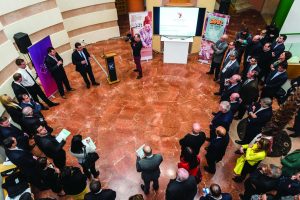Lars Lorenz interviews Prof. Russell Smith about the Centre for Entrepreneurship and Business Incubation’s M.Ent. postgraduate degree, successful start-ups, and a new reward-based crowdfunding service called Zaar.
C
rowdfunding services like Kickstarter have made it possible to fund an idea and launch a new business. Companies like Facebook and Google show the potential tech start-ups have, and inspire many others to develop their own Intellectual Property (IP) and try their luck. Start-ups are thriving with 100 million launched annually but just over half fail. Young business founders typically do not have the experience to run a business, while competition is cutthroat.
The Centre for Entrepreneurship and Business Incubation (CEBI, University of Malta) is the academic arm of a new start up ecosystem trying to turn ideas into successful businesses. CEBI offers a Master’s degree in Knowledge-Based Entrepreneurship (M.Ent.), consisting of ten modules over the course of three semesters. The Centre introduces students to the basics of entrepreneurship and finances, as well as how to plan marketing strategies, while encouraging them to make their ideas happen.
Students are then paired with a tutor for their entrepreneurship project. Through the project, their business ideas are evaluated for their viability and sustainability. The idea is then developed into a fully-fledged business plan by the end of the degree that can be launched as an actual business after graduation.
Prof. Russell Smith lectures on the M.Ent. at CEBI and has already helped over 3,000 people into business. He has taught similar degrees in Italy, Latvia, and seven UK universities including Oxford. He was invited to Malta and is now planning to deliver a doctorate in Entrepreneurship (D.Ent.) here. This is one part of the jigsaw to create the right environment to turn ideas into business to boost Malta’s socio-economic growth. Prof. Smith sees immense potential.
The graduates
Although the course has only been offered since 2013, 75 people have undertaken CEBI’s M.Ent. degree. One of them is Lewis Holland, CEO of DiscountIF. Holland was part of the first batch of students, and has made good use of the CEBI training.
‘What if you could get your money back on anything?’, Holland asked at one point, planting the seed for what will eventually grow into a successful start-up. DiscountIF is a service through which people can purchase products online, with the chance of getting a 100% refund. The catch is that customers need to predict the result of certain public events correctly in order to be refunded. The idea is simple: instead of giving out a 10% discount to everyone, the service refunds approximately every tenth purchase in its entirety, also there is no drawback if the prediction was wrong, since customers would probably have bought the item anyway.
Another graduate is Tyron Baron, now CEO at InboundMuse. He completed the M.Ent. degree just after launching his company in 2014. ‘[My] offices are part of the TAKEOFF Business Incubator at University, meaning that some of my best [mentors] are always available’, says Baron, indicating how he has already benefited from their support and networks. InboundMuse is building an artificial intelligence [AI] system to understand brands through online media. The AI system will be used to build strategic and tactical marketing plans and help marketers enact them.
‘In a sense, it is like an enhancement drug for marketeers.’ Baron emphasises that ‘a new company needs to be innovative if it wants to succeed’. InboundMuse found its niche by approaching key companies. They now plan to expand the business internationally.
New monies
Business is unforgiving. One of the biggest hurdles is raising finance, but how do you encourage people to invest in fledgling, high-risk start-up businesses?
A new source is online crowdfunding. The idea has existed for a few years now and Malta has joined the movement by starting its own service called Zaar. Zaar is a joint venture between the Malta Business Bureau and the University of Malta, which enables people to showcase their project, to show how much money they need to make it happen, and to attract people to invest in some way. These backers could be buying an event ticket, a product, or backing a cause, although these items might not yet exist. If the backed project gets funded successfully, then the fledgling company has to deliver.
After seeing the incredible response to the project, even the government and Mater Dei helped out, proving that crowdfunding can do more than raise money.
Reunited Pet Cabin is a Zaar success story. Over €13,000 were raised to create a designated pet area within Mater Dei Hospital. After seeing the incredible response to the project, even the government and Mater Dei themselves helped out, proving that crowdfunding can do more than raise money. Zaar helps raise awareness about innovative products but also important social issues. ‘There is more to crowdfunding than simply attracting enough money to kick-start your project,’ elaborates Zaar manager Karl Grech.
No perfect recipe exists to start up a business. While having a good idea and knowledge of what steps to take next go a long way, they are no guarantee for success. Many start-ups fail and prospective entrepreneurs need to learn how to do things properly—a good academic background in entrepreneurship helps one deal with these problems, but practical experience and mentoring are key. This issue will be tackled in the D.Ent. programme, but a country’s start-up culture takes time to nurture. Another five to ten years will probably have to pass until we experience a noticeable effect of these [programmes]’, says Smith, ‘but we are slowly getting there. These things don’t happen overnight.’







